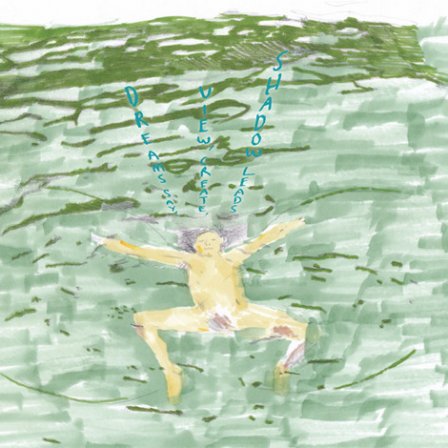Perhaps the most significant moment on the new Dustin Wong album occurs right at the end. After nearly 60 minutes of delicately intertwined, densely layered guitar loops, the former Ponytail guitarist decides it’s time to interject his voice. Words, however, are not required. On Diagonally Talking Echo, pre-verbal yelps and playful hollering reminiscent of Animal Collective serve as the moment when the wizard peeks his head out from behind the curtain. In a live setting, it was the only moment in which he broke from determinedly lacing loops and tapping his half-moon of pedals, and, as he stood up out of his chair, his bellowing was a kind of joyous release. It seemed like a triumphant moment for Wong (even if he was in his socks); it was a classic performer’s bow at the end, kind of a way of saying, “Hey guys, it’s just been me here. Thanks for listening!”
His latest album and second widely-available effort as a solo artist is Dreams Say, View, Create, Shadow Leads. As the title suggests, it’s a vivid, challenging listen with multiple strands of guitar loops interwoven, playfully inviting you to grab onto any single thread or ride the entire undulating wave. The way that Wong talks about his music — as a process involving shapes, prisms, textile equipment, layers of cake — you get the sense of his strong grasp of process and theory, yet there is a frolicsome, child-like quality there as well. His oeuvre, as a member 0f Ecstatic Sunshine and Ponytail, and now as a solo artist, is as thematically coherent as it is perpetually exuberant. Stack these projects end-on-end in your iTunes and it turns into a birthday-party-worthy, ‘choose your own adventure’ romp.
Intricacy is a big feature of Dreams Say. There is so much to latch onto in Wong’s nimble playing that giving yourself over to deft attention feels like a massage for your brain. Procession is also important but only in the way that Wong stacks loops, continually building to false or minor crescendos, dissolving into another song like a wave softly lapping the shore then receding. In this way, it’s a bit difficult to discuss this record’s individual song highlights. It was basically recorded live (a believable fact after seeing Wong in person), and the whole thing has a lateral, ever-shifting quality, perhaps intended to replicate viewing the landscape from a train window. I’ve always found train rides to be especially hypnotic in the way they distort time, and listening to Dreams Say is no different — you swear you’ve seen that building only moments before, but you know its something completely new. Wong’s music works in this way to dissolve your perception.
Rather than discussing track highlights, it’d be easier to talk about specific passages, as these songs tend to turn into a wonderful melange. “Toe Tore Oh” is a standout six-minute sprint beginning with a noise that I swore I had heard before on Ecstatic Sunshine’s similarly delay- and loop-filled Yesterday’s Work, an album created by Matt Papich after Wong had departed the group, but I couldn’t find that exact tenuous guitar delay. (It is kind of amazing to compare these two records as they complement each other so well.) It’s a song that leaves you breathless before fading into “On/In the Way” that’s slightly reminiscent of 60s girl pop with its sugary swing. Despite Wong’s guitar wizardry, there are plenty of sticky hooks and hummable melodies to be found, and their existence inside the delicate, shifting tapestries are what makes Dreams Say so endearing. The duration of this album passes like a particularly vibrant, enjoyable dream, and thankfully it’s one that you can have again and again.
More about: Dustin Wong




